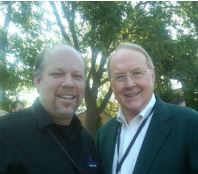Jacob I Loved, Esau I Hated
The doctrine of election teaches that the work of salvation in our lives is ultimately catalyzed and accomplished not by you, but by God. And it’s a doctrine that teaches that salvation is not a result of God offering salvation to you and then sitting back and hoping that you choose Him; it’s because God pursued you.
Genesis 25
In Genesis 25, Abraham’s son Isaac marries a woman named Rebekah. She can’t have children, so Isaac prays, and she conceives twins. And while they’re in the womb, they’re struggling and beating each other, as brothers are prone to do. Rebekah asks God why these two children are beating each other, and God answers that it is because two nations are in her womb, and two peoples from within her shall be divided and “The one shall be stronger than the other, the older shall serve the younger” (v. 23b ESV).
In virtually all patriarchal ancient societies, the firstborn son had what was called the birthright. Second-born sons were an afterthought, but not here. God chooses Jacob, the second-born son, over Esau, the firstborn son. God chooses Jacob to be the heir of salvation. The line of the Messiah, the line of Jesus, the line of salvation goes through Jacob. It does not go through Esau for one reason: because God chose Jacob.
Romans 9
The idea of the older now serving the younger made no sense to the early Roman Christians, and so Paul begins to explain it in Romans 9:8 (ESV): “This means that it is not the children of the flesh who are the children of God, but the children of the promise are counted as offspring.” In other words, his point is God’s children are not saved because of earthly merit. They’re saved because of God’s work and God’s promise.
Paul is trying to tell us that God is the author of salvation, not man. “For this is what the promise said: ‘About this time next year I will return, and Sarah shall have a son’” (v. 9 ESV). And then in verses 10–12 (ESV) Paul writes, “And not only so, but also when Rebekah had conceived children by one man, our forefather Isaac, though they were not yet born and had done nothing either good or bad—in order that God’s purpose of election might continue, not because of works but because of Him who calls—she was told, ‘The older will serve the younger.’”
Conclusion
In Romans 9, Paul explained what was happening in Genesis. Paul is telling us that God was trying to show us when this happened that this older, deserving son was going to serve the younger, undeserving son, not because of works but because of Him who calls.
Recent Sermons
God won’t hear you!
September 19, 2017
Lies of the Church
May 08, 2017
The Pursuit of a Sinner~ Mark 2:14–17
February 21, 2017

